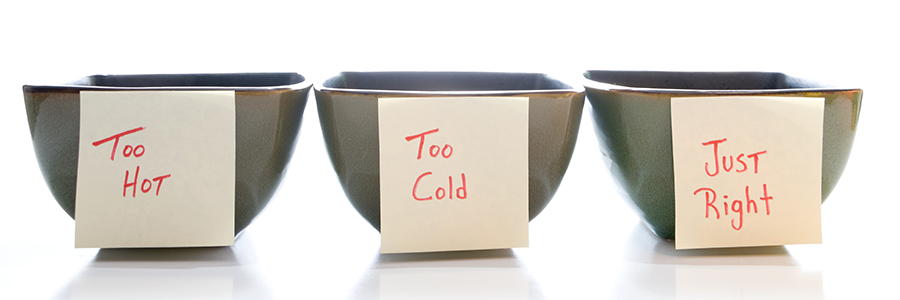How Humidity and Dry Air May Impact Your Indoor, “Just Right” Comfort?

In the popular children’s story, Goldilocks quickly realized that too hot or too cold is not a good thing. Most people appreciate when temperatures, especially indoor temperatures, are “just right.” Humidity control of your home’s indoor air is essential to ensuring that the temperature you set on the thermostat or control system is ‘just right’ for you and your family.
When it comes to humidity, the Department of Energy suggests that your air conditioner or heat pump may make an indoor space more comfortable in hot, humid climates. While the main job of the air conditioner or heat pump is to condition the air to a set temperature, these comfort-creating pieces of equipment may lower the indoor humidity level as a by-product of the cooling process. However, if the indoor humidity level remains high, you could still feel uncomfortably damp despite a cooler temperature.1
Relative Humidity
The temperature you feel has a lot to do with how much moisture, or water vapor, is in the air. Think back to Goldilocks’ porridge (a fancy name for oatmeal!). If there is a small amount of porridge in the bowl, you can add more. But if the bowl is full of porridge, there is a good chance it will spill over the side. The same is true of water vapor in the air. The more water vapor in the air, the less room there is for more to be added. If the air is filled with water vapor, it drops out in the form of rain, sleet or snow. The percentage of water vapor in the air, compared to how much it could hold without dropping out at a specific temperature is the relative humidity.2
The Good and Bad of Evaporation!
When moisture evaporates from our skin, it has a cooling effect. Scientists tell us that evaporation rates increase when the relative humidity decreases.3 That means, when all other conditions are identical, dry air absorbs moisture faster than humid air. Why? Because there is room for more water vapor!
Indoor air with higher humidity has an increased amount of water vapor. As a result, sweat may not evaporate from our skin as quickly as it would with a lower humidity level. This phenomenon may make us feel hotter than the actual temperature because evaporation is slowed. According to the Missouri Department of Energy, most people will feel cooler in a room at 75°F and a relative humidity between 50% and 55% than in a room at the same temperature with a higher relative humidity.4
While high indoor humidity may make you feel uncomfortable, air with low humidity level can impact your comfort as well. While there are many variables involved (including air pressure, temperature, and wind speed, etc.) evaporation rates tend to increase with low humidity levels. When evaporation increases, the dry air may leave our skin and other parts of the body that require moisture, feeling dry and parched.5 Proper humidity levels keep you, your furniture and your home from drying out.
The “Just Right” Feeling
Depending on the season and the geographical location of your home, your indoor spaces may be prone to high or low indoor humidity levels. But despite site-specific variables, every person has unique preferences on their ideal specific humidity and temperature settings required to get that “just right” feeling.
The idea of indoor humidity control sparked one of the first uses of air conditioning in the southern U.S. (link to ice, physics article) Stuart W. Cramer installed the first air conditioning system in North Carolina in order to create “ideal” humidity levels at his cotton mills. However, conventional heat pumps and air conditioners are not meant to control both temperature and humidity independently.6 Dehumidification just happens to be an incidental by-product of the refrigeration cycle!
During the refrigeration cycle, warm air comes in contact with the cold evaporator coil in your air conditioner or heat pump. When this happens, some moisture may be condensed out of the air making your home feel less humid. Any moisture collected by the coil goes to a drain and sent outside, away from your home.
But if your home’s air conditioner or heat pump is oversized for your space, it may not be removing as much moisture as a properly sized and matched unit. A unit that is too large for your home may cool your indoor space quickly, but cycle off before providing the incidental dehumidification.
A licensed professional HVAC dealer may suggest a separate or additional dehumidifier, which can reduce the relative humidity in your home to a comfortable level. A dehumidifier may:
- Reduce the cold, clammy feeling that comes from lowering the temperature on your thermostat in order to reduce the humidity level in your home7
- Help create an environment where dust mites can’t easily survive (when air is maintained below 50% relative humidity*)7
- Helps protect your hardwood flooring from warping when set to maintain the relative humidity in the range recommended by the hardwood flooring manufacturer7
If you feel the humidity level is too high for your indoor spaces, your licensed or professional HVAC dealer can inspect your system and provide solutions that can create that “just right” feeling in your home.

1 Department of Energy. Energy Saver - Dehumidifying Heat Pipes. n.d. https://energy.gov/energysaver/dehumidifying-heat-pipes. 2017 4 May.
2 University of Illinois Extension. Treehouse Weather Kids. n.d. https://extension.illinois.edu/treehouse/clouds.cfm?Slide=2. 4 2017 May.
3, 4 Dougherty, Elizabeth. MIT School of Engineering. 10 May 2011. https://engineering.mit.edu/engage/ask-an-engineer/why-do-we-sweat-more-in-high-humidity/. 2017 4 May.
5 Energy Star. Common Home Problems and Solutions: Dry Air. n.d. https://www.energystar.gov/index.cfm?c=home_solutions.hm_improvement_dryair. 2017 4 May.
6 American Society of Heating and Air-Conditioning Engineers. Top Ten Things About Air Conditioning. n.d. https://www.ashrae.org/resources--publications/free-resources/top-ten-things-about-air-conditioning#10. 4 May 2017.
7 Clean Comfort Indoor Air Essentials. Dehumidifiers. n.d. http://www.cleancomfort.com/#humiditycontrol. 4 May 2017.